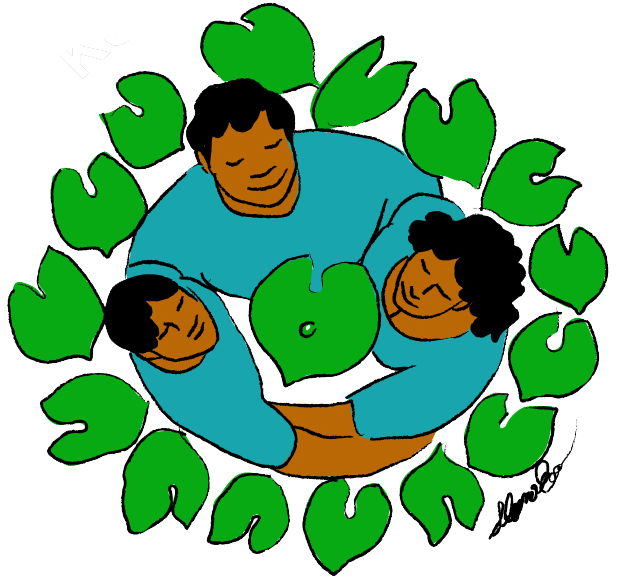Joan Takamori - KKV’s July ‘Āina Warrior
by Ka’ohua Lucas
Part 1: October 1, 2020
Aunty Joan has been bringing her University of Hawai’i nursing leadership team to Hoʻoulu ʻĀina for the past three years. Today she is hosted by our lāʻau practitioner, Pua Pinto. Pua carries a few tools in her bag as the three of us make our way to the hale where we will weed the ʻahu.
Joan Takamori wears an umber-colored t-shirt with triangular shapes cascading down the left side of her tee. She has matching earrings that mimic the pattern on her shirt. I notice it immediately and ask if it were intentional. “No, it just felt like I should wear it today,” she grins.
“I did not feel my role was to push medicine onto them, but to support them in a way in which they did things.”
Aunty Joan has always had a relationship with ʻāina even as a young girl. Her mom believed in the healing power of plants and was constantly experimenting on the young Joan.
“Just take this,” her mom urged.
“Why?”
“Because you sick.”
“That’s gross,” she gagged. “This is pretty bad.”
“Just take it. It’s healthy.”
Aunty Joan ended up graduating from nursing school as a public health nurse. She was disappointed that alternative medicine classes were optional and not integrated into the regular nursing program. She could feel that the professors who taught those classes were not receiving the kind of support they needed from administration.
She also noticed a broken system, as a public health nurse working with Tongan expectant mothers on the North Shore. The families explained that in their homeland, giving birth occurred naturally at home and not in the hospital. “The only reason to visit a hospital is if you’re sick.” And so, Joan would routinely visit the homes of the families to provide prenatal checkups, which is a state requirement.
Working with these families helped her understand how best to support the hāpai women in that community. “And so, I actually learned a lot from them – their choices, why they chose to do it that way, and how they chose to raise their children. I did not feel my role was to push medicine onto them, but to support them in the way in which they did things. I think my upbringing helped me navigate that,” she says.
Part 2: October 7, 2020
“It’s all about allowing the land to heal us”
Aunty Joan carefully weeds around the stone ʻahu in front of the hale. As morning light falls gently on her faded ʻalaea-colored tee shirt and lovingly wraps around her body, she reaches for a garden tool to remove an uninvited weed.
Joan grew up with lāʻau (medicinal herbs) and always believed in the power of plants. As a nurse trained in public health and oncology, she saw the value in blending western medicine with the lāʻau practices she learned at home and her time spent at Hoʻoulu Āina.
Her belief system was recently challenged when she was diagnosed with lymphoma. Instead of using conventional medicine exclusively to treat the cancer, Aunty Joan made a decision to incorporate lāʻau as part of her healing regime.
“Yah, my doctor said I was supposed to lose 30 pounds or more, which I wish I did but I nevah,” she laughs. “I wen scold my doctor, ʻeh you told me I was supposed to lose weight!”
Having access to ʻāina and building a relationship to that wahi pana has been crucial to Aunty Joan’s healing. She learned from Pua, Hoʻoulu ʻĀina’s on-staff lāʻau practitioner, to listen to the land and respond to her rhythm. She learned about process and setting your intentions right. Ninety percent of the healing is through pule. The other ten percent is from the plant itself.
Although she has returned to work, Joan is committed to making her health a number one priority. Part of her treatment is to continue to connect with ʻāina – digging in the earth, planting lāʻau for others, weeding around the ʻahu.
She dreams that someday, ʻāina will become the piko for community health centers and that spaces will be created for patients to receive “ʻāina therapy” just as she has.
“It’s all about allowing the land to heal us,” Aunty Joan says. That’s why she is our ʻĀina Warrior. Mana Wahine. Strong. Resilient. Caring. Committed. Passionate. Healer.






